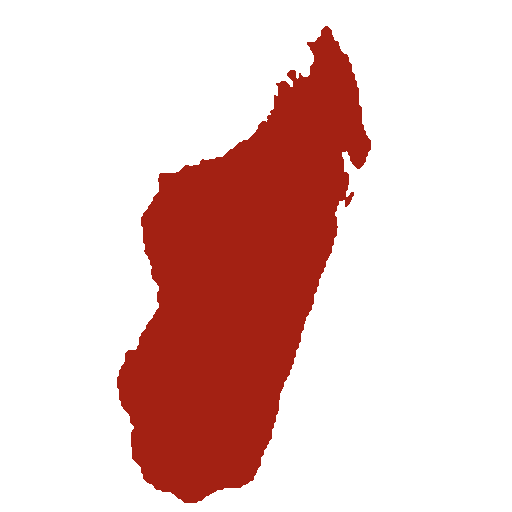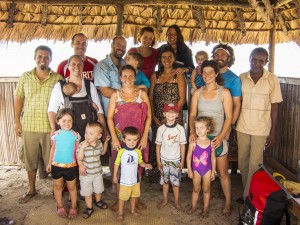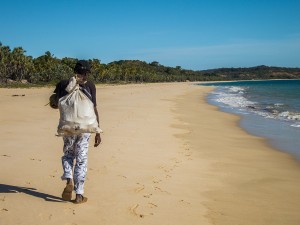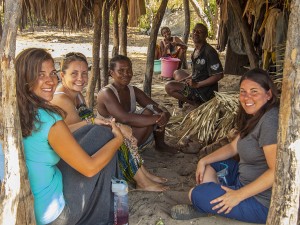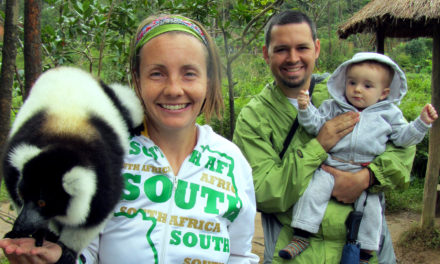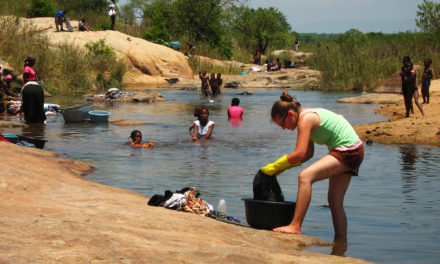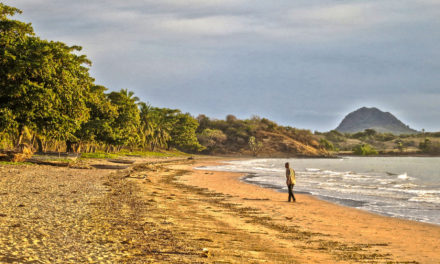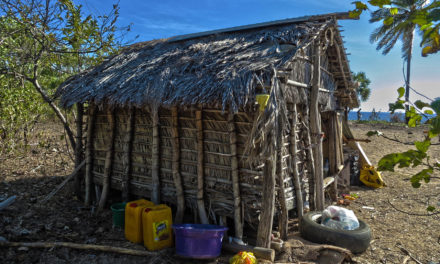
Our team boarding the boat for their first time to set foot on Nosy Mitsio… and to move straight into the home of a fellow villager.
C an you imagine being born again? Everything you see is for the first time. The world is bright and the sights are strange. Everyone’s talking at you and they’re clearly excited to see you, but none of it makes sense: it all just sounds like gibberish. No one understands the noises coming out of your mouth either. All the tastes are new and try as you might, your stomach won’t keep it all down; it all keeps running out one end or the other. You can’t take care of yourself, but you rely on someone else to prepare your bed, to feed you, to take you where you need to go. Though formerly an adult, you’ve once again become a small child, even a helpless baby.
Our team members have finally reached Nosy Mitsio! From the very first day they arrived, they were each received into the home of another family in each of their villages and they spent their first week living life together with their host family and completely out of contact with the rest of the world. What I described above is very much like their experiences during that first week of homestay and is still a lot of what they’re experiencing now, a couple weeks later.
Can you imagine? An adult, a professional, leaving behind their self-responsibility, their success, every aspect of their lifestyle, all they know and love, only to move into a cramped palm-leaf thatched hut to be completely dependent on someone they’ve never met before and with whom there’s no mutual understanding. An adult purposefully putting themselves into a place where they regress to the role and capabilities of a small child. How incredibly challenging and humiliating and ridiculous that is! Who in their right mind would do such a thing? Well, we have eight more adults and seven more small children who’ve joined us here to do just that.
Asking who would do this has an easy answer: you can see their photo here. Asking why is another thing altogether, and the answer doesn’t entirely “make sense.” Because of God’s love for the Antakarana people among whom we live on Nosy Mitsio, we now have a large team of people who’ve responded by coming to live in this way.
T he Antakarana people are a proud and exclusive group. At a defining moment in their history, the Antakarana tribe responded to a powerful imperial threat not by submitting, as did all the other tribes around them, but by running away and separating themselves, by threatening to fight to the death. During that time, they maintained their independence and their identity here on the island of Nosy Mitsio. Even today, they regularly squabble over royal lineage and split up over family feuds – they’re not the type of people who like to “give in,” no matter how much power or strength is presented to them.
When other nearby tribal groups visit Nosy Mitsio or live nearby to find some work from the ocean, they say that the Antakarana are “unwelcoming” and “don’t like visitors.” When I first travelled to Nosy Mitsio to make arrangements for my family’s move here, I was the epitome of a “weary traveler”, spending all day walking from the southern tip of Nosy Mitsio to its northernmost parts, carrying my heavy backpacks. Despite Malagasy people’s widespread fame of generous hospitality towards strangers, I couldn’t find a single person along my path who would welcome me into their home or offer me some food or something to drink. Our desire to live here had been accepted almost exclusively with the local people’s thought of quick financial gain, and even at that, there was no eagerness to receive us, no help to get us acquainted.
The following year spent building our home, preparing for our team members’ arrival, and trying to find a relational entrance into the local communities was slow work. But eventually we made friends and people came to accept and appreciate us. Yet even still, it took months of repeated conversations to convince some people in each village of the benefit and the need of receiving our team members into their homes upon our team’s arrival.
W hite people are seen with a peculiar perspective by the local people here. At first it’s very disappointing, but after living here for a while, we can now understand why. Nosy Mitsio is an island and so life revolves around the sea. Every village has one or more canoes used both for fishing and for going to mainland Madagascar. There are even a few larger wooden boats, like ours, and they occasionally have working motors, but they usually go by sail to avoid fuel costs. Other Malagasy people who work at or near Nosy Mitsio also have these same type of wooden boats. The cost of obtaining and maintaining such a boat is immense by local standards, but with very hard work, determination, and maybe a bit of luck, it can happen.
To contrast all of that, there are a number of very, very nice boats that sail by Nosy Mitsio from time to time: catamarans are the most common and most of them have cabins larger than the average hut here. Sometimes a really large yacht will even sail by, or even a whole train of nice boats on a tourist outing. The fuel costs for one trip on such a boat is often more than a local family will earn in a year. Mostly those boats and their passengers remain out at sea near our island or they’ll stop at one of the smaller uninhabited islands near Nosy Mitsio. Sometimes they do bring their passengers for a few hours on the beach here, or they occasionally even stay overnight at one of the few rustic bungalows scattered around Nosy Mitsio. When they stop on the beach here, the older white men who are their typical passengers almost always have young Malagasy prostitutes travelling with them. Sometimes they pass out gifts for kids or even just wads of cash to anyone who looks particularly destitute. When they stay the night, they always catch more fish than they can do anything with and they always bring more food than they can eat, and so local people will often get the leftovers: a veritable treasure in its value compared to local life!
Seeing these details, seeing that this is the only interaction the people of Nosy Mitsio have had with white people before us, it’s now much easier to understand their perspective. Surely white people never have to work, if they can spend that much money on fuel just to travel for fun, if they can throw away all the fish they’ve spent their day catching, if they don’t need to have actual relationships with people, but they can just buy sex whenever they want it. It’s very clear that local Antakarana people believe white people are a different type of humanity, one for whom money and food is unlimited, people who neither know how to work nor are required to, people for whom relationships are purchased rather than arrived at. They speak gibberish, but knowing a few words of it for a local person might mean a small window to the treasures that surround the white people.
C an you imagine inviting such a person into your home to live with you for a week? If the President of the U.S. showed up on your doorstep looking for a place to stay, would it be so easy to welcome him into your humble home? Or more appropriately, what if one of the unimaginably wealthy oil barons of the middle east (whose language, food, dress, religion, and all his customs are different than yours) showed up with his small children to live in your home and eat your food? And you don’t even have to worry about actually having enough food to share, only whether or not the food and accommodation will be acceptable. Yet it’s not uncommon for people here to struggle to find enough food for the day or to finish the work of re-thatching their roofs so they don’t leak at night. And we asked them to welcome an unimaginably rich and foreign person into their house, without so much as even meeting them first.
Yet despite all that, we still managed to convince some in each village to act as a host family for our team members. Yes, in a couple instances, the host families had to be re-convinced the moment their guests arrived, and for one of them that meant several hours of effort by both me and the king of Nosy Mitsio. But in the end, all of our team members spent their first week on Nosy Mitsio not by taking care of themselves and by settling in to their new homes, but by becoming dependent on the people they’ve come to minister to. And what a shocking difference it’s made to the people who’ve received them!
The first day and night was necessarily rough and awkward and scary for all involved. We visited all of the villages and re-explained (again) why this is a good thing and that yes, these white people really are there with them and they’re depending on them, and they’re intended to participate in nearly every aspect of their host family’s lives. (And that, yes, they can actually eat rice.) But after a couple days of our team members doing their best to work together with their hosts in their rice fields, weaving ropes together, tying up fences together, clearing land together, diving for fish together, cooking together, hand-washing clothes together, picking fruit together, fetching water together, eating together, sleeping under the same roof… then there was a sense of belonging and ownership.
When our team members got sick during the week or their kids were picky about the food, their host families did their best to take care of them. And they had a strong enough opinion about the best way to do that, that they were even willing to argue with me about it!
Before the week was finished, each host family began bragging about their “white people”, comparing them to the others on our team and saying that their own were clearly the best. Whether that was best at learning language, or clearing fields, or spearing fish, or eating rice, or just had the thickest skin against the prickly thornbushes – it was all a source of pride for their hosts, like parents proud of their children. And for some of their hosts at the end of the week, our team members were no longer just their “white people”, but their “children” or “grandchildren”. For one of the host families where I had to work the hardest up front to get them to accept our team members to live with them, I also had to work hardest at the week’s end to assuage their fears about our team members moving into their own home – explaining that they were still friends and “relatives” and they could still eat together and work together, only that they’d be sleeping under different roofs now.
W ithin this very short period of time, Lora and I have seen a remarkable difference in all of the villages that our team members are now living in. We’re now seeing big smiles and warm greetings on every face we see, rather than the cautious stares or general unfriendliness that was all-too-common before. Other than just people’s warm expressions or the excitement of their speech or the pride by which they take ownership of our team members, there’s also a general sensation of openness beginning, of barriers being broken – throughout each village. The ones who thought they had nothing to offer now have joy in new relationships begun.
All the months of anticipation, the fear of the unknown, the reluctance to welcome strangers; it all came to a head when our team arrived. Everyone’s fears were confronted and through a remarkable act of humility and of dependence, we’ve found acceptance. With the people who run and who fight when confronted with power and strength, with the people who give the cold shoulder to outsiders, and with those who’ve never believed a white person could be a regular human being, with these same people we’ve found a way in. By us depending on them in full vulnerability, they’ve learned to accept us and to welcome us, even to take pride in their relation to us.
It seems strange that it should work this way. It doesn’t really make much sense when you think about it, and it certainly doesn’t make any sense while you’re in the middle of this whole process of being “born again” into a new culture among a new people. Being born again hurts! It’s painful! What fool would choose to do such a thing? Yet it does work and it’s working here now among the Antakarana. It’s power in weakness.
After all, when the Author of all Creation, the Owner of more riches than any human being could imagine, when he decided to come to us, he also decided to come as a child. He made his home among a poor young couple and was born in a dirty stable full of animals. I’m sure he cried out with the pain of birth, as much as any baby does. And he must’ve cried even more from the shock of being born into a poor and dirty world, leaving the purity and beauty of Heaven behind. But he chose to come and he came this way: as a weak dependent child; that we who are lowly and broken and hurting, we who are running from the power of the oppressors of this world, that we might accept this child and know him and that he might save us.
Please pray with us that the Antakarana would see God’s strength in our weakness, that in our foolishness they would be made wise in him and that they would experience the power of his salvation.
In Christ,
Adam, Lora, and Matimu
